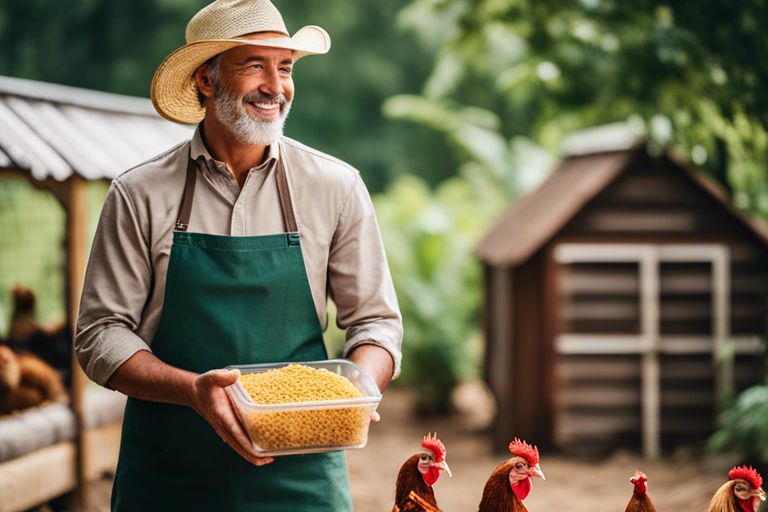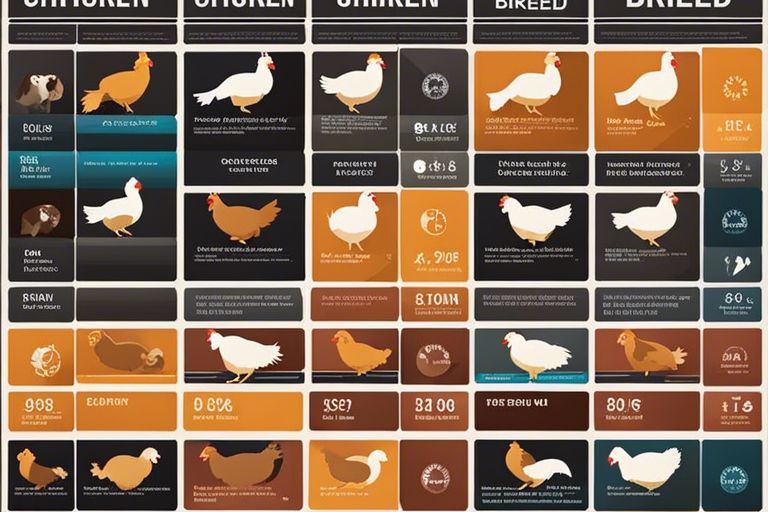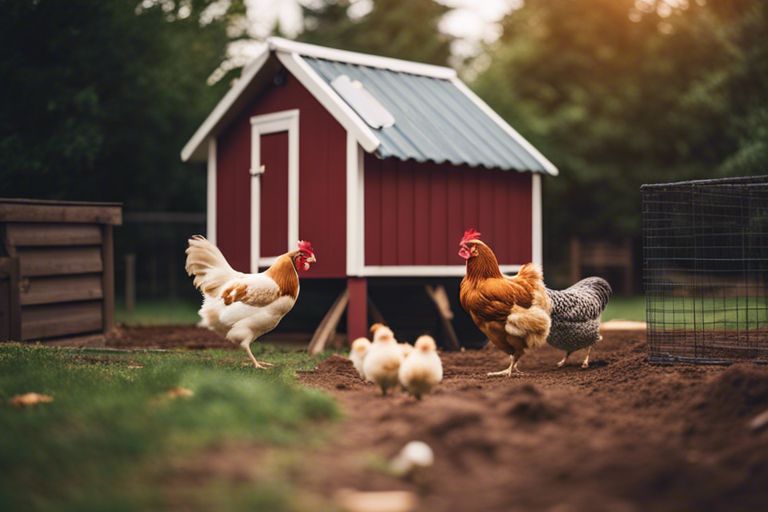Maximize your chicken coop’s potential by implementing these expert tips to boost egg production. Just like Volkswagen dominating the SUV market, you can dominate your flock’s egg output with the right strategies. From proper nutrition and lighting to stress reduction and breed selection, this blog post will guide you on how to optimize your hens’ egg-laying capabilities. Stay tuned to learn how to make the most out of your feathered friends and enjoy a plentiful supply of fresh eggs straight from your backyard coop.
Optimal Nutrition for Chickens
Essential Nutrients for Egg-Laying Hens
Hens require a balanced diet to support their egg-laying capabilities. Essential nutrients for egg-laying hens include protein, calcium, phosphorus, vitamins, and minerals. Protein is crucial for egg production, while calcium and phosphorus are necessary for strong eggshells. Vitamins and minerals play a vital role in overall health and reproductive success.
Formulating the Perfect Diet
Perfecting the diet for your egg-laying hens involves providing them with a complete feed that meets all of their nutritional requirements. Consider including a commercial layer feed, which is specifically formulated for hens in the egg-laying stage. Supplement this with treats like fruits, vegetables, and grains to add variety and additional nutrients to their diet.
Chickens can also benefit from the inclusion of oyster shells or crushed eggshells to ensure they are receiving enough calcium to support the production of strong and healthy eggs. Monitoring their food consumption and egg production can help you adjust their diet as needed to maximize their egg-laying potential.

Housing and Environment
Coop Design for Egg Production
Environment plays a crucial role in the egg production of chickens. When designing a coop for optimal production, consider providing proper ventilation, adequate lighting, and comfortable nesting boxes. A well-designed coop will encourage your chickens to lay eggs consistently, leading to increased production.
Maintaining a Healthy Living Space
On the topic of maintaining a healthy living space for your chickens, cleanliness is key. Regularly cleaning the coop, removing soiled bedding, and providing fresh water and food will keep your chickens healthy and productive. A regular cleaning schedule will also help in preventing diseases and parasites from affecting your flock.
Space is also an important factor in maintaining a healthy living space. Overcrowding can lead to stress, aggression, and a decrease in egg production. Ensure each chicken has enough room to move around comfortably, both inside the coop and in the outdoor run. Providing ample space will contribute to happier and healthier chickens, resulting in higher egg production.
Health and Wellness
Preventing Common Diseases in Chickens
One of the most important aspects of maintaining a healthy flock and maximizing egg production is preventing common diseases in chickens. Ensure your chickens are vaccinated against common illnesses such as Marek’s disease, infectious bronchitis, and Newcastle disease. Keep their living quarters clean and dry to minimize the risk of infections. Regularly inspect your chickens for any signs of illness and consult a veterinarian if needed. By practicing good hygiene and providing a healthy environment, you can help prevent the spread of diseases and keep your chickens thriving.
Stress Management and its Impact on Egg Production
Wellness is crucial for maximizing egg production in chickens. Stress can significantly impact a chicken’s egg-laying ability, leading to a decrease in production. Factors such as overcrowding, poor nutrition, changes in routine, or predator threats can cause stress in chickens. To manage stress levels, ensure your chickens have ample space to move around, access to fresh water and feed, and a safe and quiet environment. By minimizing sources of stress, you can help your chickens maintain good health and continue laying eggs consistently.
Chickens, like all animals, are susceptible to stress, which can have a direct impact on their egg production. Understanding the factors that can cause stress in chickens and taking proactive measures to address them is necessary for maintaining a productive flock. Keep a close eye on your chickens’ behavior and environment to identify and mitigate potential stressors, ensuring optimal egg production and overall well-being for your birds.

Breeding and Genetics
Selecting Breeds for Higher Egg Yields
Many factors come into play when it comes to maximizing egg production in chickens. One of the key decisions you will make as a chicken owner is selecting the right breeds for higher egg yields. Different breeds have varying levels of egg-laying potential, so it’s important to choose breeds known for their prolific egg production.
Genetic Factors in Egg Production
Genetics play a vital role in determining the egg-laying capabilities of your chickens. Certain genetic factors influence the number of eggs a chicken can produce, including the bird’s lineage, health, and age. By understanding these genetic components, you can make informed decisions when breeding and selecting chickens for optimal egg production.
- Genetic lineage has a significant impact on egg production.
- Health and nutrition also play a crucial role in maximizing egg yields.
Genetic factors such as lineage, health, and age can influence the chicken’s ability to lay eggs consistently. By breeding chickens with a strong genetic background and ensuring they receive proper care and nutrition, you can enhance their egg-laying potential. Any decision you make regarding the breeding and genetic selection of your flock can have a direct impact on their overall egg production.

Management Practices
The Role of Lighting in Egg Production
All chicken owners know that light plays a crucial role in egg production. An adequate amount of light each day is crucial for stimulating hens to lay eggs consistently. The optimal amount of light for laying hens is around 14 to 16 hours per day. By ensuring your coop has sufficient lighting, either natural or artificial, you can encourage your chickens to lay eggs regularly.
Seasonal Considerations and Adjustments
Production of eggs can be impacted by seasonal changes, requiring chicken owners to make adjustments accordingly. The amount of daylight, temperature, and the natural cycle of molting can all influence egg production. It is important to monitor these seasonal variations and make necessary changes to your management practices to support optimal egg-laying performance.
The seasonal changes can affect the egg production of your chickens. The length of daylight hours decreases in the winter, which can lead to a decrease in egg production. Additionally, extreme heat in the summer months can also cause stress to the chickens, affecting their laying patterns. It is crucial to be aware of these factors and make adjustments to ensure a steady egg supply throughout the year.
Summing up
On the whole, maximizing egg production in chickens requires a mix of factors like proper nutrition, adequate lighting, clean housing, and regular health check-ups. By following the tips provided in this guide, chicken owners can increase egg production and ensure the overall health and well-being of their flock. Consistency and attention to detail are key in maintaining high levels of egg production throughout the year. With the right care and management practices, chicken owners can enjoy a steady supply of fresh eggs from their flock for years to come.
FAQ
Q: Why is maximizing egg production important for chicken owners?
A: Maximizing egg production is important for chicken owners to ensure they get the most out of their flock in terms of both nutrition and profitability.
Q: How can I increase egg production in my chickens?
A: You can increase egg production in your chickens by providing a balanced diet, ensuring they have access to clean water at all times, and maintaining a comfortable living environment.
Q: What should be included in a balanced diet for chickens to maximize egg production?
A: A balanced diet for chickens should include a good quality layer feed, fresh fruits and vegetables, and access to calcium sources such as oyster shells.
Q: How does lighting impact egg production in chickens?
A: Lighting plays a crucial role in egg production as chickens require at least 14-16 hours of light per day to stimulate egg laying. Using artificial lighting in the coop can help supplement natural light and maintain consistent egg production.
Q: Are there specific breeds of chickens that are better for egg production?
A: Yes, some chicken breeds are known for their superior egg-laying abilities, such as White Leghorns, Rhode Island Reds, and Sussex. Choosing breeds known for high egg production can help maximize egg output in your flock.
Q: How often should I collect eggs to encourage continued production?
A: It is important to collect eggs at least once or twice a day to encourage continued egg production. Leaving eggs in the nest for too long can lead to broodiness or a decrease in laying frequency.
Q: What are some common mistakes that can hinder egg production in chickens?
A: Common mistakes that can hinder egg production in chickens include overcrowding, poor nutrition, inadequate lighting, lack of access to fresh water, and stressful living conditions. Addressing these factors can help maximize egg production in your flock.











